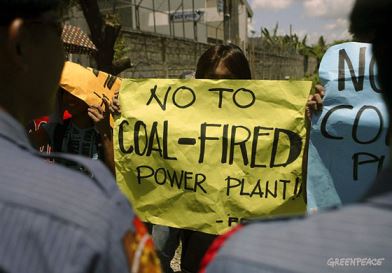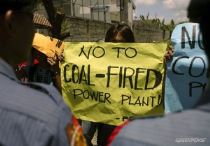
DAVAO CITY (Mindanao Examiner / Oct. 9, 2012) – Environmentalists and various community groups from at least 6 provinces in the southern Philippines have formed a group called Anti-COALition which aims to promote clean and renewable energy in the country.
The group also declared its intention to explore legal options in the fight against dirty coal power projects in Mindanao to protect not only the environment, but also human health from the ill-effects of pollution.
The declaration came at the conclusion of a two-day seminar and workshop on Environmental Law organized by Greenpeace in partnership with the Ateneo Public Interest Legal and Advocacy Center. Participants discussed laws protecting land and sea ecosystems, indigenous people, and biodiversity as well as civil legal procedures that can be used in environmental cases.
“The seminar on Environmental Law made us more aware of our basic rights to demand that the state protect its citizens from environmental harm and degradation,” said Julad Suazo, a community leader from Davao City, in a statement sent to the Mindanao Examiner.
She said there are at least 10 coal-fired power plants in operation throughout the country, but the Department of Energy wanted to add 12 more of the fossil-fuel plants within the next four years to augment electricity supply despite massive protests from various environmentalist groups.
Suazo said coal-fired power plants will further lock the Philippines in to dirty and polluting fossil-fuel over the next four decades.
“Everywhere around the world, coal power plants victimize communities. They create health problems for people living around the facility, and damage their environment and their livelihoods,” said Anna Abad, Climate and Energy Campaigner for Greenpeace Southeast Asia.
“Taking legal action to end the coal regime in Mindanao is a clear message from communities that they are determined to stand up and defend their rights against the oppressive Goliath that is the coal industry. Clean, renewable energy sources are abundant in Mindanao. Green investments from renewable energy technologies are what the Department of Energy should instead be developing in a massive scale,” she added.
She said communities are the ones who are paying the price for the world’s dirtiest fossil fuel. Coal use endangers the well-being of families and the environment. She said in every place where coal is mined and used to generate power, communities suffer environmental damage and health problems.
Burning coal also accelerates climate change whose extreme weather impacts have already cost the country thousands of lives and billions of pesos in losses, Abad said.
Mindanao is the “new frontier” for dirty coal power projects for a total output of 1,550 megawatts in Davao, Davao del Sur, Misamis Oriental, General Santos, Saranggani, and Zamboanga.
Aboitiz Power and Conal Holdings are among companies engaged in fossil-fuel energy and insisted that their technology uses so-called “clean” coal.
Emissions from coal plants are a primary source of air pollution: they contain a lethal mix of sulphur dioxide, which causes acid rain; the greenhouse gas nitrogen oxide; and heavy metals like mercury and arsenic, as well as lead and chromium.
Coal is also a leading cause of global climate change – the extreme weather impacts of which have already cost the Philippines thousands of lives and billions of pesos in losses.
In Davao City, the construction of coal-fired power plants in the village of Dumoy is threatening to displace thousands of families and would diminish Dumoy aquifer’s capacity to supply water for drinking and other domestic needs to some 1.4 million inhabitants.
In Saranggani province, a coal-fired power plant is also currently being constructed near a marine sanctuary and environmentalists said it will damage the surrounding ecosystem and endanger the livelihoods of local fishermen.
“We have tried all possible means to stop the coal-fired power project from pushing through but no one is listening. Now more than ever, we are more united and firm in our opposition to any energy development plan that prioritizes coal corporations, over the well-being of present and future generations of Filipinos,” Suazo said.
In August, community representatives from at least 16 provinces in the country called on the government to abandon coal energy expansion and instead ensure the country’s sustainable development with a future powered by clean, peaceful, renewable energy.
They also publicly denounced the government’s coal projects through a manifesto signed during the National Anti-Coal Summit organized by Greenpeace.
Anti-coal communities have been actively waging their own battles against coal power companies and with their local governments to demand for the closure and cancellation of coal power plants in their respective areas.
Communities hosting coal-fired power plants would be living under the shadow of life-threatening toxic emissions, destroyed livelihoods and greater water scarcity.
Von Hernandez, Executive Director of Greenpeace Southeast Asia, said solutions are available to reduce dependence on polluting, dirty and deadly coal energy. He said the government must prioritize and support green investments which will help put the country on a low-carbon growth pathway, instead of pursuing investments which are harmful to society, peace and order, and the environment.
This way, further human and societal damage, as well as ecological degradation and devastating climate change impacts, can be avoided, he said.
Environmentalists signed the “People’s Declaration Against Coal and In Support of Clean Renewable Energy,” which demanded the Department of Energy take immediate action to protect the well-being of communities by immediately cancelling all new coal power and coal mining projects and phasing out existing coal facilities; implementing and enforcing the Renewable Energy Law; and increasing the country’s renewable energy targets to facilitate a massive uptake of clean sustainable energy in the Philippines. (Mindanao Examiner)

